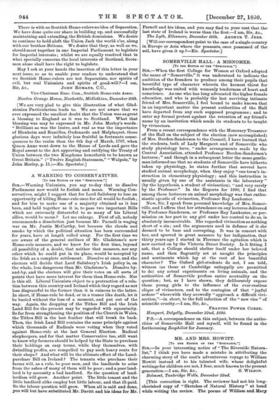A WARNING TO CONSERVATIVES.
[To THE EDITOR Or THE " 13PECTLTOR."3 SIB.,—Warning Unionists, you say to-day that to dissolve Parliament now would be foolish and mean. Warning Con- servatives, might I suggest that for Lord Salisbury to lose an opportunity of killing Home-rule once for all would be foolish ; and for him to make use of a majority obtained as it has been, and held together as it is, to pass two important Bills which are extremely distasteful to so many of his Liberal allies, would be mean ? Let me enlarge. First of all, nobody recommends a dissolution just because Mr. Parnell is waging war on Mr. Justin McCarthy, but because the clouds and smoke by which the political situation has been surrounded for years, have at length rolled away. For the first time we are aware of the general outlines of Mr. Gladstone's new Home-rule measure, and we know for the first time, beyond all possibility of a doubt, that neither that measure, nor any other which he could put in its place, would be accepted by the Irish as a complete settlement. Dissolve at once, and the electors will decide that Lord Salisbury's Irish policy is, on the whole, less dangerous than Mr. Gladstone's. Dissolve by- and-by, and the electors will give their votes on all sorts of points that have more interest for them than Home-rale. Nor is this all. Liberal Unionists object to a protraction of a rela- tion between this country and Ireland which they regard as not less disgraceful to the former than it is ruinous to the latter. In short, if Home-rule be dead, or in a trance like death, let it be buried without the loss of a moment, and put out of the way. Again, the dropping of the Tithes Bill and the Irish Land Bill for the present may be regarded with equanimity. So far from strengthening the position of the Church in Wales, the Tithes Bill is the last feather that will break its back. Then, the Irish Land Bill contains the same principle against which thousands of Radicals were voting when they voted against Home-rule at the last General Election. Radical shopkeepers, and for that matter Conservative too, still want to know why farmers should be helped by the State to purchase their holdings on easy terms, while they themselves, with dwindling profits, are compelled to pay such heavy rents for their shops ? And what will be the ultimate effect of the Land- purchase Bill on Ireland ? The tenants who purchase their farms will, as a rule, be poor men, and the landlords to arise from the ashes of many of them will be poor; and a poor land- lord is by necessity a bad landlord. So the question of land- lordism will grow. Another point. The little tenant and the little landlord alike employ but little labour, and that ill-paid. So the labour question will grow. When all is said and done, you will but have substituted Mr. Davitt and his ideas for Mr. Parnell and his ideas, and you may find to your cost that the last state of Ireland is worse than the first.—I am, Sir, &c., The Lyth, Ellesmere, December 20th. A.RTH1TR T. JEER.
[Will our correspondent point to the case of a single country in Europe or Asia where the peasants, once possessed of the soil, have given it up ?--En. Spectator.]


































 Previous page
Previous page